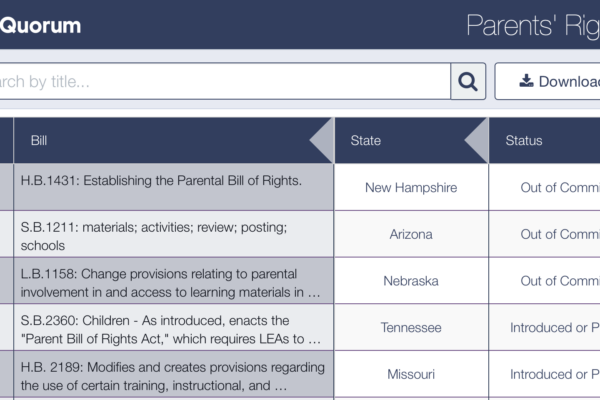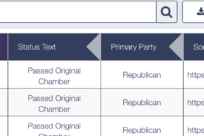The growing movement to give parents more control of their children’s education has produced a spate of legislation at statehouses, where governors and legislators, most of them Republicans, are pushing to protect and expand parents’ rights to know what is taught in classrooms and play a more prominent role in educational decisions. Some bills would allow parents to sit in the classroom or watch videos of the instruction happening there.
FutureEd has identified 85 bills in 26 states pre-filed or introduced this year alone that seek to expand parents’ rights in schools. So far, six have been enacted, two in Florida, two in Arizona and one in Georgia and Louisiana. One more bill in Kansas has cleared the legislature and awaits the governor’s signature. Some expand or amend existing “Parents’ Bill of Rights” while others establish such a bill for the state. Several bills focus on providing transparency on curriculum and materials. And some bills seek to regulate school board meetings, such as Maryland HB 618 which states that at “each public meeting, the board shall allow at least 10 minutes for testimony from parents and guardians.”
In many cases, the bills are a response to the polarization surrounding critical race theory and are explicitly tied to the teaching of race and racism. For example, Indiana HB 1134, which bans the teaching of divisive concepts related to race, also mandates parent curriculum review committees and requires all instructional materials to be publicly posted online for review. Similarly, Louisiana HB 414 expands the Parents’ Bill of Rights to assert that schools cannot teach children “they are currently or destined to be oppressed or be oppressors based on the child’s race or national origin.”
Many other bills extend beyond the teaching of racial history and include exposure to inappropriate content in school libraries and curricular materials, discussions about gender and sexuality, and other divisive concepts.
In early March, the Florida legislature passed a parents’ bill of rights, HB 1557, dubbed the “Don’t Say Gay” bill, which was later signed into law by Republican Gov. Ron DeSantis. The bill prohibits classroom discussion and “instruction by school personnel or third parties on sexual orientation or gender identity” for grades K-3 or that is not age or developmentally appropriate.
Under Arizona HB 2439, parents will have access to all available books in school libraries and to the specific books borrowed by their children. Illinois HB 5505 would give parents “the right object to and refuse any unit of instruction or required course of study that directs, requires, or otherwise compels a student to personally affirm, adopt, or adhere to any of the specified tenets.”
Missouri HB 1858 goes further, not only giving parents the right to review all materials but allowing them to request information about who is teaching their child and to “visit the school and check in on their minor child during school hours.” Parents can then “bring a civil action for injunctive relief against the school district or public school” for any violations, which could result in the temporary withholding of state formula funding.
Florida’s HB 1055 goes a step further, allowing schools districts to install video cameras and require that teachers in those classrooms wear a microphone. Parents, school employees and other specified entities would be able to request to view footage; however, it cannot be used for teacher evaluations and is only intended to ensure the “health, safety, and well-being of students in the classroom.”
The interactive tracker, which includes all these bills and their status, will update automatically.


